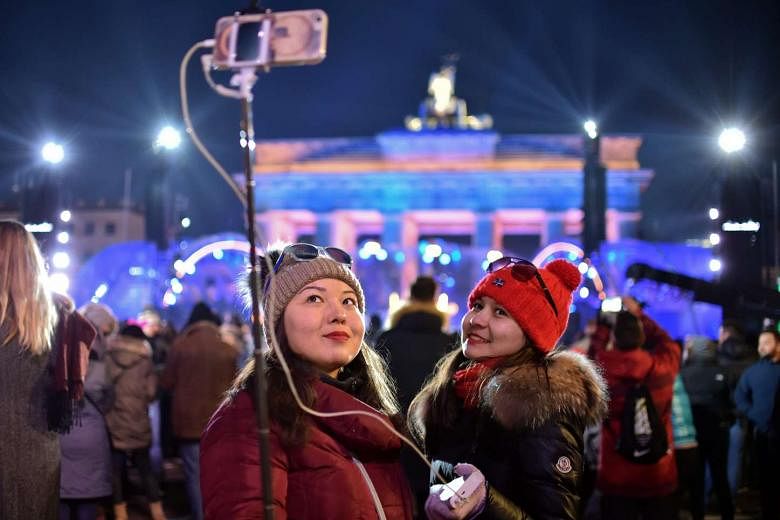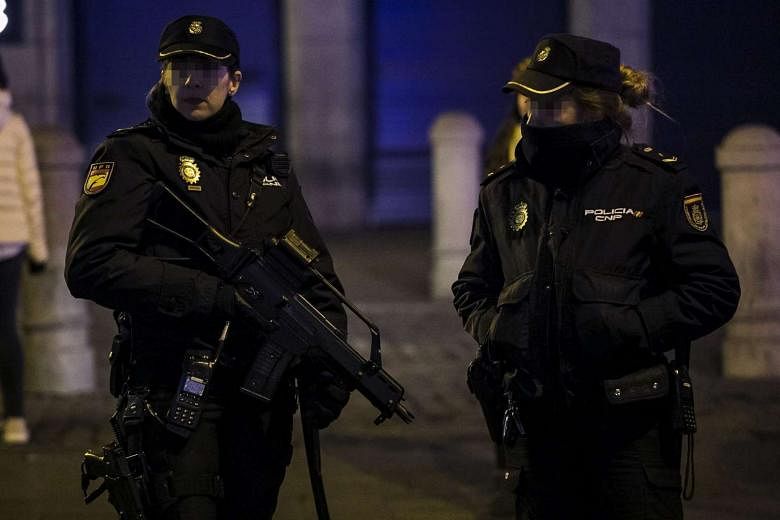SYDNEY (AFP) - People around the world shrugged off terror jitters to see in 2017 in style, as Sydney kicked off the party with a spectacular fireworks display that lit up its iconic harbour.
Around 1.5 million people packed Australia's biggest city to watch as the midnight fireworks erupted from Sydney Harbour Bridge sending rainbow-coloured showers soaring into the night sky.
Crowds in Hong Kong also flocked to the waterfront to watch fireworks explode over Victoria Harbour while in Japan thousands packed the streets of Tokyo to release balloons into the air.
The raucous celebrations drew to an end a year of bloodshed and misery that has seen the war in Syria, Europe's migrant crisis and numerous terror attacks dominate the headlines.
It has also been a year of political shocks, from Britain's vote to leave the European Union to the election of maverick leaders in the United States and Philippines.
And the bloodshed continued on Saturday, with twin bomb blasts killing at least 27 in a busy market area in central Baghdad.
But this did not stop people flooding the streets of the Iraqi capital to celebrate and families in evening dress headed to swanky hotels for parties.
Fadhel al-Araji, a 21-year-old from the neighbourhood of Sadr City, already had his beer in the back of his car.
"Tonight is about fun... Everybody can do what they want and nobody cares. We need a night like this, Iraq needs it," he said, behind the wheel of his beat-up Toyota.
In the shattered Syrian city of Aleppo, 20-year-old student Abdel Wahab Qabbani was also determined to see in 2017 in a positive frame of mind.
"The last two years, I didn't go out for New Year. This time, I'm going to party," he said.
The Gulf emirate of Dubai marked the new year with its usual gigantic pyrotechnics off the world's highest skyscraper, Burj Khalifa, as well as other landmarks.
This year's celebration passed without problems, unlike last year when a fierce blaze broke out at a nearby tower.
Security was stepped up in major world cities from Sydney to New York as authorities fretted that the large crowds of people could present a target for extremists.
There were some 2,000 extra officers in Sydney after a man was arrested for allegedly making online threats against the celebrations and garbage trucks were deployed to block any attempt to plough a vehicle into the crowd.
Following a deadly attack on a Berlin Christmas market on December 19, the German capital beefed up security, deploying extra police, some armed with machine guns.
"This year, what's new is that we will place concrete blocks and position heavy armoured vehicles at the entrances" to the zone around Brandenburg Gate, said a police spokesman.
However, visitors seemed undeterred by recent events as they began to gather under a freezing Berlin sky for a series of concerts ahead of a large midnight fireworks display in the area.
In Paris, there will be fireworks again, after muted 2015 celebrations following the massacre of 130 people by jihadists in the French capital.
Nearly 100,000 police, gendarmes and soldiers will be deployed across France against the jihadist threat and President Francois Hollande inspected the security measures on the city's famous Champs-Elysees.
Brussels, meanwhile, reinstated its firework show after last year's was cancelled at the last minute due to a terrorist threat.
With more than a million people expected to turn out to watch the ball drop in Times Square, New York is deploying 165 "blocker" trucks and some 7,000 police.
Extra security was also in place in Moscow, Istanbul and London.
The sky over Red Square exploded with fireworks, delighting the 6,000 revellers allowed in - for the second consecutive year, numbers were limited.
Rome stationed armoured vehicles and greater numbers of security forces around the Coliseum and St Peter's Square, where Pope Francis will celebrate a "Te Deum" hymn of thanksgiving.
In a mass earlier on Saturday, the pontiff urged people to reflect on the plight of the young as the year drew to a close.
"We have created a culture that idolises youth... yet at the same time paradoxically we have condemned our young people to have no place in society," he said.
Elsewhere, issues other than terrorism threatened to dampen the party.
Up to two million people were expected at Rio's Copacabana beach. But with Brazil mired in its worst recession in a century, the fireworks have been cut to just 12 minutes.
And normally boisterous Bangkok was seeing in the new year on a more sombre note as the nation grieves for King Bhumibol Adulyadej, who died in October.
Nevertheless, revellers will at least get one extra second to enjoy the night's festivities.
At the stroke of midnight, there will be a "leap second" decreed by the International Earth Rotation and Reference Systems Service to allow astronomical time to catch up with atomic clocks that have called the hour since 1967.











